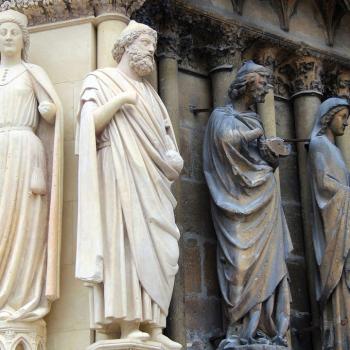Left Behind, pp. 236-237
The worst horrors of the Great Tribulation are yet to come. The sun will go dark and the seas will turn to blood. There will be earthquakes, famines, pestilence, Wormwood and giant locusts.
But none of that seems quite as awful as what poor Chloe Steele has to endure on page 36:
Over lunch [Rayford] told Chloe of his history with Hattie, such as it was.
Ew. Finding out your dad was unfaithful to your mom would be bad. Having to sit there, in a restaurant, while your dad presented a "history" of the affair would be much worse.
But as much as I pity poor Chloe, I wish LaHaye and Jenkins had let us hear some of what Rayford had to say. Based on Chloe's reaction, he didn't quite convey the picture we got earlier in the book of his warped, control-freak kinkiness:
She was silent a long time, and when she spoke her voice was weak. "So you never actually acted on it?" she said.
"Thankfully, no. I never would have been able to live with myself."
Rayford spares his daughter an account of the "private necking session he enjoyed at a company Christmas party" while his wife was nine months pregnant with her little brother. He was apparently able to live with himself for that one.
That "necking session" remains a strange detail (and not just because they call it a "necking session"). It seemed intended to round out the portrayal of Rayford as an unsaved sinner. But then the authors also seemed to share his casual, dismissive attitude toward that lapse and toward the woman involved.
Rayford's lunchtime confession could have been an excruciatingly funny scene, rather than just an excruciating one, if either the character or the authors had been capable of more honesty.
This is a bit of a stock comic story: the new convert's earnest confession that makes things worse. Almost every Christian can tell you such a story. So can everyone in Alcoholics Anonymous (in many ways, AA is just like Christianity, only more so). My Name Is Earl became a hit TV show by telling variations of such AA stories every week.
What makes such stories so wincingly funny is the disconnect between the new disciples' desperately earnest good intentions — their desire to make amends for past wrongs — and the trouble they cause by resurrecting those wrongs though their awkward, overly precise confessions.
Rayford's confession provides no laughs, only winces, because he doesn't seem to be guilelessly well-intentioned. He's still trying to defend himself, stressing that he never "acted on" his pseudo-affair with Hattie. That defense avoids the creepy truth, that Rayford seems to have gotten his rocks off precisely by never "acting on" the emotions he cultivated in Hattie. He wasn't looking for the act, he was looking for the ego-boost he got from creating and maintaining the ever-present, never-fulfilled, never explicit offer from Hattie. It wasn't about sex and it wasn't about love. It was about power. That much is made exquisitely clear in the first chapter of the book — a kinky portrayal made all the creepier by the fact that it seems unintentional.
Chloe, understandably, segues into a discussion of her departed mother's devout faith. Thinking of her mother's "hopes and expectations" for her, Chloe says, shaped some of the decisions she made while she was away at college.
The authors surely have a bit of an agenda in telling us this. They want to commend devout parents, and to reassure them that they've been raising their kids well. There's certainly nothing wrong with that, and it seems right to suggest that such parents — those who encourage and expect their children to choose virtue over vice, whose children know they are loved and prayed for — would have a positive influence on their kids.
But this being the world of Left Behind, what passes for "devout" is a bit different than in a more normal context. Here saintly mothers don't just sit at home praying for their children, they also regularly harangue them with warnings of the apocalypse.
"I knew she was praying for me," Chloe says of her mother. "She told me every time she wrote." The next two lines are these:
"Did she also tell you about the end times, Chloe?"
"Sure. All the time."
This is a world in which mothers don't just urge their college-bound children to eat right, get enough sleep, keep up with their studies and avoid the party crowd. They also warn their children against the imminent One World Government, quiz them on the seven bowls and the seven seals, and offer words of encouragement about the birth of a red heifer. They do this "All the time."
So Chloe's mother never stopped telling her about the End Times. And her father is now detailing his creepy, years-long flirtation with a woman closer to her age than to his.
This might explain why Chloe went to Stanford and not Northwestern.
















